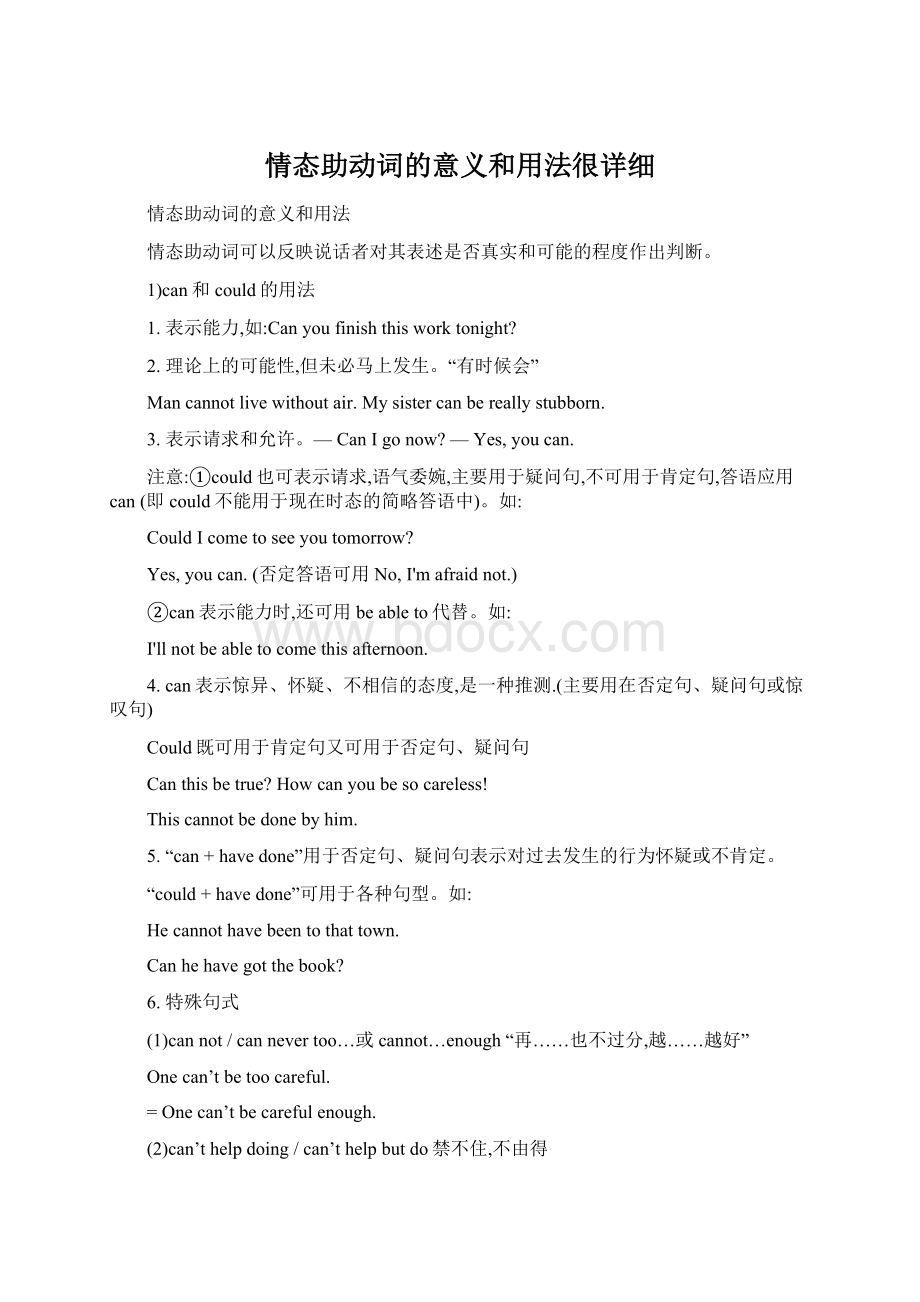情态助动词的意义和用法很详细.docx
《情态助动词的意义和用法很详细.docx》由会员分享,可在线阅读,更多相关《情态助动词的意义和用法很详细.docx(7页珍藏版)》请在冰豆网上搜索。

情态助动词的意义和用法很详细
情态助动词的意义和用法
情态助动词可以反映说话者对其表述是否真实和可能的程度作出判断。
1)can和could的用法
1.表示能力,如:
Canyoufinishthisworktonight?
2.理论上的可能性,但未必马上发生。
“有时候会”
Mancannotlivewithoutair.Mysistercanbereallystubborn.
3.表示请求和允许。
—CanIgonow?
—Yes,youcan.
注意:
①could也可表示请求,语气委婉,主要用于疑问句,不可用于肯定句,答语应用can(即could不能用于现在时态的简略答语中)。
如:
CouldIcometoseeyoutomorrow?
Yes,youcan.(否定答语可用No,I'mafraidnot.)
②can表示能力时,还可用beableto代替。
如:
I'llnotbeabletocomethisafternoon.
4.can表示惊异、怀疑、不相信的态度,是一种推测.(主要用在否定句、疑问句或惊叹句)
Could既可用于肯定句又可用于否定句、疑问句
Canthisbetrue?
Howcanyoubesocareless!
Thiscannotbedonebyhim.
5.“can+havedone”用于否定句、疑问句表示对过去发生的行为怀疑或不肯定。
“could+havedone”可用于各种句型。
如:
Hecannothavebeentothattown.
Canhehavegotthebook?
6.特殊句式
(1)cannot/cannevertoo…或cannot…enough“再……也不过分,越……越好”
Onecan’tbetoocareful.
=Onecan’tbecarefulenough.
(2)can’thelpdoing/can’thelpbutdo禁不住,不由得
(3)Can’thelp(to)do不能帮助做某事
(4)can’t/couldn’t+比较级=最高级
2)may和might的用法
1.表示许可。
表示请求、允许时,might比may的语气更委婉一些,否定回答时要用mustn't表示“不可以”、“禁止”、“阻止”之意。
如:
Youmaydrivethecar.
—MightIuseyourpen?
—No,youmustn't.
用MayI...征询对方许可在文体上比较正式,在口气上比较客气。
在日常口语中,用CanI...征询对方意见在现代口语中更为常见。
肯定回答用Yes,youmay./Yes,please./Certainly./Sure,goahead.
否定回答用No,youmustn’t./No,you’dbetternot.
2.用于祈使句中表示祝愿。
May+主语+动词原形
如:
Mayyousucceed!
3.表示推测,一般不用于疑问句。
might的可能性比may小。
Hemaybeverybusynow.
4.“may(might)+havedone”表示对过去发生的行为的推测。
如:
Hemaynothavefinishedthework.
5.may/mightaswell+动词原形“不妨,不如”
Youmay/mightaswellgotoseeadoctor.
3)must和haveto的用法
1.表示必须、必要。
如:
Youmustcomeintime.
回答must引出的问句时,如果是否定的回答,不能用mustn't,而要用needn't或don'thaveto。
—Mustwehandinourexercisebookstoday?
—Yes,youmust.(No,youdon’thaveto.)
2.must表示命令或强制,用于否定句的mustn't表示说话人不许或禁止(某人做某事)。
例如:
Youmustdoasyouaretold.你必须遵嘱行事。
Youmustn'tmoveanyofthepapersonmydesk.你不许动我办公桌上的任何文件。
—MayIborrowthisbook?
我可以借这本书吗?
—No,youmustn't.不,不可以。
3.must表示“偏要”,“非要”
Mustyoumakesomuchnoise?
你偏要弄出那么多噪音吗?
Ofcourse,afterIgaveheradvice,shemustgoanddotheopposite.
当然,在我劝了她以后,她非要做相反的事不可。
4.must表示推测,只用于肯定句。
它的否定或疑问式用can/could代替must。
Thismustbeyourpen.
5.“must+have+done”的结构常用在肯定句中,表示对过去发生的行为的推测。
它的否定或疑问式用can/could代替must。
HemusthavebeentoShanghai.
含Must的反义疑问句:
A.must表示“应该”,其疑问部分用mustn't(不应该),如:
Youmustworkhardnextterm,mustn'tyou?
下学期你应该努力学习,对吗?
B.must表示“必须”,其疑问部分用needn't(不必),如:
Theymustfinishtheworktoday,needn’tthey?
他们今天必须要完成这项工作,是吗?
C.陈述部分含情态动词mustn't,表示禁止时,疑问部分就可以用must或may,如:
Youmustn’tstopyourcarhere,mustyou?
(maywe?
)你不能把车停在这地方,知道吗?
D.must表示推测,其疑问部分必须与must后面的主要动词相呼应。
如:
①对现在动作或存在的情况的推测:
Youmustknowtheanswertotheexercise,don'tyou?
你一定知道这项练习的答案,是不是?
Thatmustbeyourbed,isn'tit?
那一定是你的床,是吗?
②对过去发生的动作或存在的情况的推测:
(一)句中陈述部分没有表示过去的时间状语,这时疑问部分中的动词就用
现在完成时。
(haven’t/hasn’t+主语)
Youmusthavetoldheraboutit,haven’tyou?
你一定把这事告诉她了,是吗?
(二)陈述部分有表示过去的时间状语,疑问部分的动词就用
一般过去时。
(didn’t+主语)
Shemusthavereadthenovellastweek,didn’tshe?
她上星期一定读了这本小说了,是吗?
6.haveto的含义与must相似,两者往往可以互换使用,但haveto有各种形式,随have的变化而定。
must与haveto有下列几点不同:
①must表示的是说话人的主观看法,而haveto则往往强调客观需要。
如:
Theplayisnotinteresting.Ireallymustgonow.
IhadtoworkwhenIwasyourage.
②二者的否定意义不大相同。
如:
Youmustn'tgo.你可不要去。
Youdon'thavetogo.你不必去。
③询问对方的意愿时应用must。
如:
MustIcleanalltheroom?
4)dare和need的用法
1.need表示“需要”或“必须”,作情态动词时,仅用于否定句或疑问句中,在肯定句中一般用must,haveto,oughtto,或should代替。
如:
Youneedn’tcomesoearly.
—NeedIfinishtheworktoday?
—Yes,youmust.
注意:
needn't+完成式“表示本来不必做而实际上做了某事”。
如:
Youneedn'thavewaitedforme.
2.Dare作情态动词时,主要用于疑问句、否定句和条件从句中,一般不用在肯定句中。
有过去时dared。
如:
HowdareyousayI'munfair.
Hedaren'tspeakEnglishbeforesuchacrowd,darehe?
3.Dare和need可作实义动词,用于各种句型,有时态、人称和数的变化,所不同的是,作实义动词时,在肯定句中,dare后面通常接带to的不定式,在否定和疑问句中,dare后面可接带to或不带to的不定式。
如:
Idaretoswimacrossthisriver.Hedoesnotdare(to)answer.
Don'tyoudare(to)touchit!
Heneedstofinishitthisevening.
5)shall和should的用法
Shall
(1)用于第一人称的陈述句,表示将来。
如:
Ishallcometomorrow.
(2).Shall用于第一、第三人称疑问句中,表示说话人征求对方的意见或向对方请示。
如:
Shallwebeginourlesson?
Whenshallhebeabletoleavethehospital?
(3).Shall用于第二、第三人称,表示说话人给对方命令、警告、允诺或威胁。
如:
Youshallfailifyoudon'tworkharder.(警告)
HeshallhavethebookwhenIfinishreading.(允诺)Heshallbepunished.(威胁)(4)应该,应当.用于条约,规定,规章等文件中,表示一种义务,多用于第三人称中。
Heshallhavetherighttoownthehouseaccordingtothelaw.(法律条文)
---CanIpaythebillbycheck?
---Sorry,sir.Butit'sthemanagementrulesofourhotelthatpaymentshallbemadeincash.(规章制度)
Should
(1)表示劝告、建议、命令,其同义词是oughtto;在疑问句中,通常用should
代替oughtto。
如:
Youshouldgotoclassrightaway.
ShouldIopenthewindow?
(2)should用于第一人称时可以表示说话人的一种谦逊、客气、委婉的语气。
①Ishouldthinkitwouldbebettertotryitagain.我倒是认为最好再试一试。
②Youaremistaken,Ishouldsay.依我看,你是搞错了。
(3)Should还可以用在if引导的条件从句,表示一件事听起来可能性很小,但也不是完全没有可能。
相当于“万一”的意思。
从句谓语由should加动词原形构成,主句谓语却不一定用虚拟语气。
如:
①Ifyoushouldchangeyourmind,pleaseletusknow.万一你改变主意,请通知我们。
②ShouldI(IfIshould)befreetomorrowIwillcome.万一我明天有时间,我就来。
(4)此外,Why(orHow)+should结构表示说话人对某事不能理解,感到意外、惊异等意思。
意为“竟会”。
如:
①Whyshouldyoubesolatetoday?
你几天怎么来得这么晚?
②—WhereisBettyliving?
—贝蒂住在哪里?
—HowshouldIknow?
—我怎么会知道呢?
③Idon'tknowwhyyoushouldthinkthatIdidit.我真不知道你凭什么认为这事是我干的。
(5).Should表示推测,按常理,按惯例应该.如。
Theyshouldarriveby10o’clock.
.“should/oughtto+havedone”表示本应该做而实际上没有做,包含一种埋怨、责备的口气。
如:
Sheshouldhavefinishedit.Ishouldhavehelpedher,butInevercould.
6)will和would的用法
1.表示请求、建议等,“Will/Wouldyou….”would比will委婉客气。
如:
Wouldyoupassmethebook?
2.表示意志、愿望和决心。
如:
Iwillneverdothatagain.Theyaskedifwewoulddothatagain.
3.will表示习惯和倾向性。
will表示现在的习惯,would表示过去的习惯,此时的意义接近usedto如:
Oilwillfloatonwater.油总是浮在水上。
Thiswindowwon’topen.这扇窗户经常打不开。
Thewoundwouldnotheal.(过去伤口老不愈合。
would与usedto的区别:
1)usedto强调今昔对比(过去这样,现已不是这样);would只是回顾过去,常与often,frequently,sometimes,always,forhours,onSundays等表频率的词连用。
2)would只能表示过去习惯性的动作,而usedto既可表示动作,也可表示状态
4.will表示对目前情况的推测,主要用于第二、三人称。
如:
Thiswillbethebookyouwant.
Hewillhavearrivedbynow.
7)oughtto的用法
1.Oughtto表示应该。
如:
Yououghttotakecareofhim.
2.表示推测。
注意与must表示推测时的区别:
Hemustbeathomebynow.(断定他已到家)
Heoughttobehomebynow.(不十分肯定)
3.“oughtto+havedone”表示过去应做某事而实际未做。
如:
Yououghttohaveaskedhim(butyoudidn't).
这时,oughtto和should可以互相换用。
8)usedto,hadbetter,wouldrather的用法
1.Usedto表示过去的习惯动作或状态,现在已不存在,在间接引语中,其形式可不变。
如:
Hetoldusheusedtoplayfootballwhenhewasyoung.
在疑问句、否定句、否定疑问句或强调句中,可有两种形式:
疑问句Didyouusetogotothesameschoolasyourbrother?
Usedyoutogotothesameschoolasyourbrother?
否定句Iusedn'ttogothere.
Ididn'tusetogothere.
Usedn't亦可拼作usen't,但发音皆为[ju:
znt]。
否定疑问句Usen'tyoutobeinterestedinthetheatre?
Didn'tyouusetobeinterestedinthetheatre?
强调句Icertainlyusedtosmoke,butitwasalongtimeago.
Icertainlydidusetosmoke,butitwasalongtimeago.
其反意疑问句或简略回答中,也有两种形式:
Sheusedtobeveryfat,didn'tshe?
(正式)/use(d)n'tshe?
(口语)
Didyouusetoplaychess?
Yes,Idid.
Usedyoutogetupearlyinthemorning?
Yes,Idid.(Yes,Iusedto.)
2.Hadbetter意为“最好”,后接不带to的不定式。
如:
—Wehadbettergonow.
—Yes,wehad(we'dbetter/wehadbetter).
Hadn'twebetterstopnow?
(Hadwebetternotstopnow?
)
IthinkI'dbetterbegoing.(用于进行时态,表“最好立即”)
Youhadbetterhavedonethat.(用于完成时态,表未完成动作)
注:
①hadbest与hadbetter同意,但较少用
②Youhadbetter…用于同辈或小辈,对长辈不可用。
3.Wouldrather意为“宁愿”,表选择,后接不带to的不定式。
如:
I'drathernotsayanything.Wouldyouratherworkonafarm?
—Wouldn'tyouratherstayhere?
—No,Iwouldnot.I'drathergothere.
由于wouldrather表选择,因而后可接than。
如:
Iwouldratherworkonafarmthaninafactory.
I'dratheryoudidn'ttalkaboutthistoanyone.
9)情态动词+havedone(陈述过去)
musthavedone(肯)定/肯定做过某事
mayhavedone(肯,否)可能做过某事
mighthavedone(肯,否)本能够做某事却未做
可能做过某事